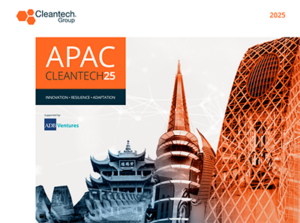APAC’s Shift Toward “Developed in Asia, for Asia” Cleantech: Mobility in India
In a year marked by significant economic uncertainty, we have observed a first half in which reactions to the common shift in the global macroeconomic environment are different across regions. In the U.S., there is a full shift to resource security and pursuing leadership in AI; in Europe, there are similar themes but also continued pursuit of renewables deployment and industrial decarbonization.
Asia-Pacific, however, is clearly making a shift toward “developed in Asia, for Asia” cleantech. Last quarter we covered the rapid advancements in APAC semiconductor and compute efficiency, partially driven by a need for local chips given fracturing trade environments.
This quarter, a clear theme shone through, providing a case study in “developed local for local”: electric mobility in India. In April of this year, The Economist floated the question, “should investors wait out the trade war in India?” While this is a question that can’t be answered based on one industrial sub-category, let alone in one quarter, the underpinning hypothesis (that Indian businesses can attain high upside just by growing within India) appears to be holding water in this space.
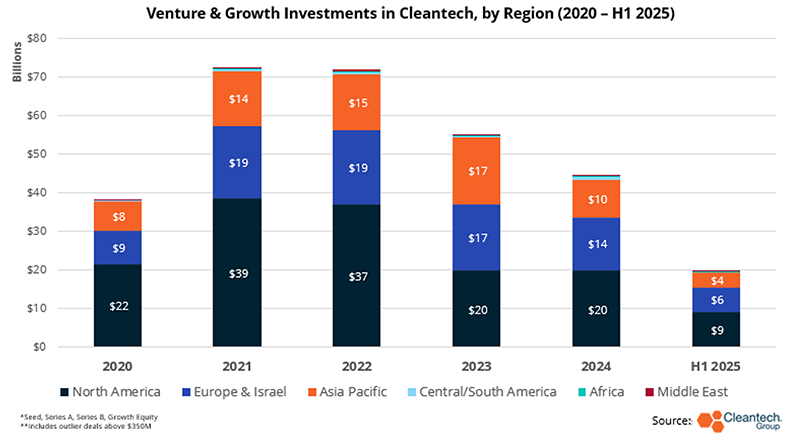
We have noted for some time the emergence of Indian electric mobility through the form of electric two- and three-wheel vehicles, as well as localized models of charging, e.g., 2025 APAC Cleantech 25 awardee Battery Smart’s battery swapping networks and 2025 Global Cleantech 100 awardee Blusmart’s electric ride hailing system.
But this quarter marks a true breakout for Indian electric mobility, comprising 35% of Transportation & Logistics deals globally (not just in Asia-Pacific) and 10% of all deals in Asia-Pacific. More telling, however, is the end-to-end electric mobility value chain that is clearly developing across the Indian economy.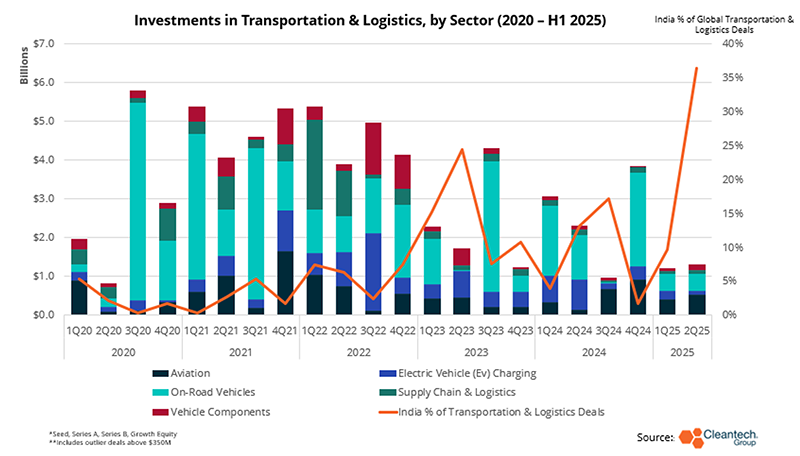
The electric mobility value chain in India is rapidly crystallizing into a comprehensive ecosystem, with specialized players addressing various critical aspects from vehicle manufacturing to infrastructure, materials, and operational solutions. This evolution is driven partially by government initiatives such as PM E-Drive which continues incentives for EV and charging infrastructure purchases from FAME II (Faster Adoption and Manufacturing of Hybrid and Electric Vehicles). However, there is no questioning that the development of technology that is tailored to local cost tolerance and usage patterns is driving uptake, versus reliance on imports. Innovation can be seen across the spectrum.
Some thematic areas of activity over this past quarter:
1. Vehicle Manufacturers
- Euler Motors: Manufacturer of electric cargo three-wheelers, producing the HiLoad EV designed for last-mile mobility and logistics with claims of high payload, battery capacity, and range. The company raised $75M in May to finance sales expansion across India.
_ - Oben Electric: Specializes in next-gen electric performance motorcycles, emphasizing in-house R&D and design for electric two-wheelers manufactured in India. The company raised $5.8M in June to scale up manufacturing within their Bangalore facility.
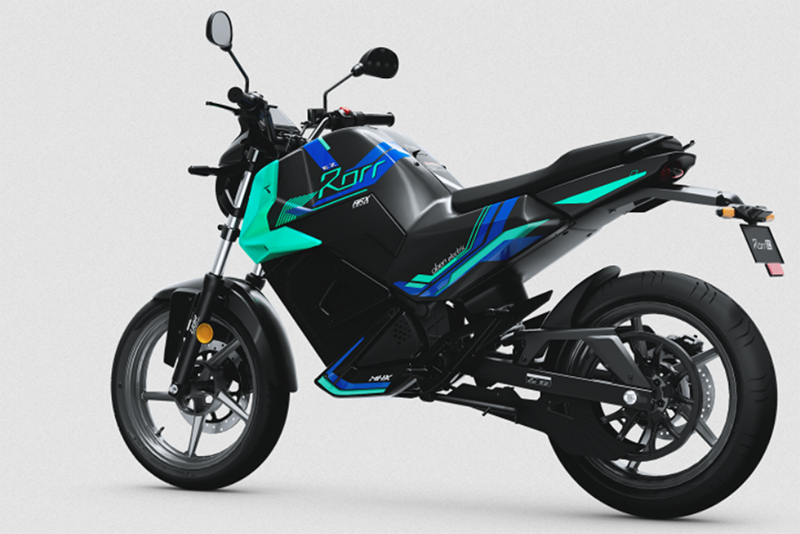
An Oben Rorr EZ (Source: Oben Electric)
- Eka Mobility: A leading electric bus and light commercial vehicle (LCV) manufacturer, part of Pinnacle Industries, focusing on zero-emission mobility solutions and developing futuristic electric and fuel-cell commercial vehicles. Eka will look to expand both bus and commercial vehicle production with a $23.6M convertible instrument, closed in May.
2. Charging and Swapping Infrastructure
An innovation space that has experienced flat equity investments globally this year, primarily due to established incumbents dominating supply in many markets, where we still see opportunities in the niche innovation spaces that serve specific, local needs. This is where Indian innovators have excelled over the past few months.
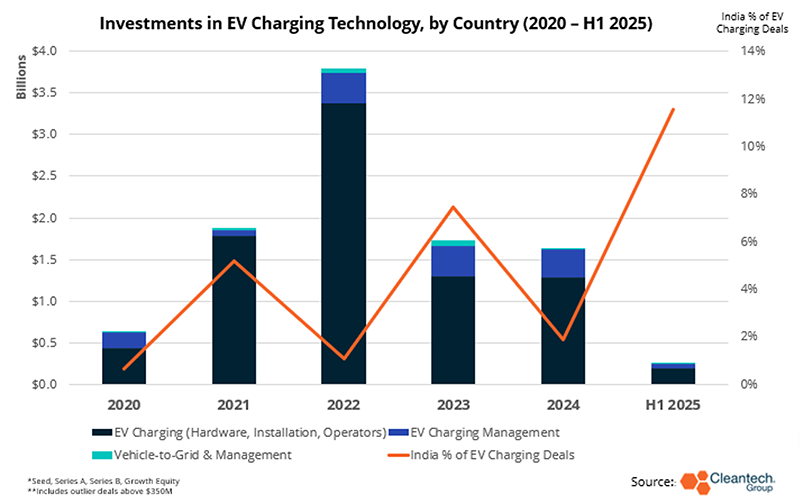
- Battery Smart (’25 APAC Cleantech 25): Operates India’s largest and fastest-growing battery swapping network for electric two-wheelers and three-wheelers, aiming to make EVs accessible through instant battery swaps across numerous cities. Battery Smart raised $29M in May to continue expansions to new cities.
_ - Kazam: Offers a full-stack EV charging solution, including smart charging hardware (AC & DC) and a cloud-based Charge Point Management System (CMS) with a user app, aiming to build India’s largest smart EV charging network. Raised $6.2M in June for continued roll-out across India.
_ - IPEC India Private Limited: A leading manufacturer of Power Conversion Products and Solutions for E-Mobility in India, providing smart and reliable chargers for 2W, 3W, and 4W automotive OEMs, as well as public charging solutions including AC and DC chargers, connectors, and CMS. The company raised a $3M Seed in April.
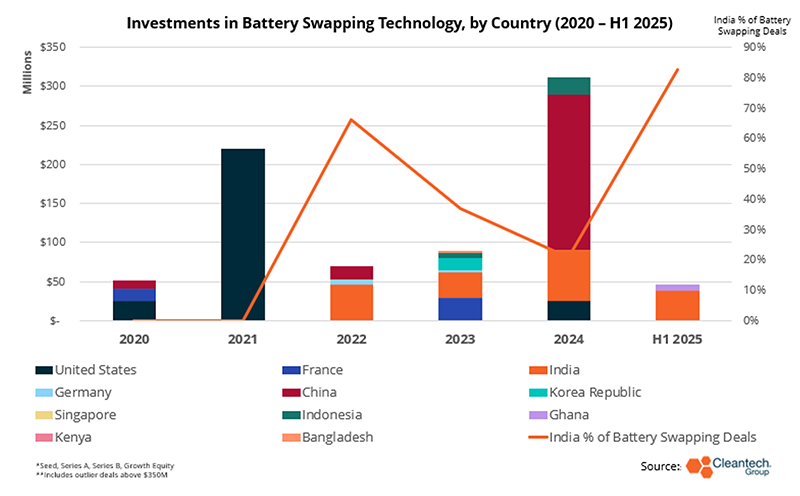
3. EV Logistics and Fleet Solutions
A typical signal of maturity in EV ecosystems is proliferation of tools to make the business models of EV and charging work, and to smooth adoption for customers. These tools play an important role in breaking adoption barriers, e.g., reducing sticker prices for consumers through leasing models, and optimizing utilization rates for fleet adopters.
- Alt Mobility: EV leasing and asset management platform, offering comprehensive electric vehicle leasing and lifecycle management for B2B fleets, individual drivers, and corporate employees, managing everything from vehicle selection to real-time fleet monitoring and charging. Alt Mobility raised an undisclosed Series B in May to further develop their platform and standardize batteries.
_ - Fyn Mobility: Pitches itself as India’s first vertically-integrated EV ecosystem platform for EV logistics, financing, manufacturing, and more, providing expert, eco-friendly, last-mile logistics solutions driven by EVs through an “EV-as-a-Service” model. Fyn Mobility raised a $2.5M Seed round in May.
4. IT Backbones
Managing charging networks, providing comprehensive services to owners of chargers, and ensuring that business models can be maintained all requires a complex IT roadmap. Fabric IoT is providing the IT backbone for many of India’s most important electric mobility players. The company operates two subsidiaries to deliver seamless integration of EVs into Indian infrastructure. Intellicar provides IoT solutions for battery management, charging automation, and usage-based billing. Buzz Energy, launching soon, aims to provide EV charging infrastructure for commercial and residential buildings. Fabric IoT raised a $13.5M Series A from Nuveen in April.
The crystallization of this value chain demonstrates a multi-faceted approach to electric mobility in India. It’s not just about producing electric vehicles, but also about building the essential charging and swapping infrastructure, creating flexible leasing and integrated logistics solutions to facilitate adoption, addressing the sustainability of core components like batteries through recycling, and even providing transitional cleaner fuel alternatives for harder-to-electrify segments like heavy trucking. There is also an emerging story here around potential export to other parts of South Asia and Africa, too – a development we’ll be watching closely.
